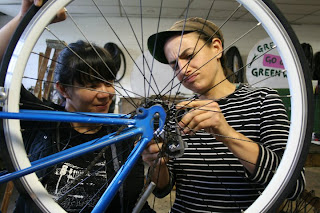EMEAC lends voice to Grassroots Global Justice 2011 Congress in Raleigh
October 24, 2011
RALEIGH -- EMEAC holds space in several important collaborations and alliances committed to revealing and addressing injustices against poor and working people and the environment. One such group is Grassroots for Global Justice [GGJ], which is an alliance of U.S.-based grassroots groups who are organizing to build an agenda for power for working and poor people. In September, Development Coordinator Ife Kilimanjaro, represented EMEAC at GGJ's 2011 Congress in Raleigh, North Carolina.
Ife, along with over 250 members and supporters, helped to shape GGJ's focus over the next year by discussing and offering recommendations for revision of its proposal called No War! No Warming! Build an Economy for the People and the Planet! These three issues were selected by GGJ staff and members of the Coordinating Committee for their overlap, the opportunity they offer to define and articulate alternatives to capitalism-in-crisis, and their impact on and implications for local, national and international organizing and movement building. Congress participants debated each of the three areas in separate working groups over two days to recommend goals, objectives and actions for the upcoming year and presented them to the larger body on the last day.
 During the morning of day 2, representatives of international social movements - World March of Women (Brazil), FASE (Brazil), Hemispheric Social Alliance (Canada/Mexico), Anti Privatization Forum (South Africa), South Durban Community Environmental Alliance (South Africa), and Alternatives (Maghrib) - participated in person and via skype to discuss their organizations and recent victories, offer their perspectives on GGJ's proposal, share their views on the state of social movements at the international level and how they've dealt with the challenge of alliances in their work.
During the morning of day 2, representatives of international social movements - World March of Women (Brazil), FASE (Brazil), Hemispheric Social Alliance (Canada/Mexico), Anti Privatization Forum (South Africa), South Durban Community Environmental Alliance (South Africa), and Alternatives (Maghrib) - participated in person and via skype to discuss their organizations and recent victories, offer their perspectives on GGJ's proposal, share their views on the state of social movements at the international level and how they've dealt with the challenge of alliances in their work.
In the afternoon, Congress participants engaged in a rally in support of working people and the poor at the Republican party headquarters. This action was picked up by the local news station and can also be viewed here: http://www.youtube.com/user/ggjalliance#p/u/7/coIF1nzNoyg .
On the last day of the Congress, members voted on 3 resolutions: offering support for Mexican Trade Unions by condemning the attacks on the independent trade union movement and freedom of association in Mexico; affirming several food sovereignty statements that support the people's democratic control of the food system, culturally appropriate food produced through ecologically sound and sustainable methods, and people's right to define their own food and agricultural systems; and supporting the Hemispheric Social Alliance's statement on unity to stop the economic crisis and build a different economy. Support for each was unanimous.
Videos of presentations and interviews can be viewed at http://www.youtube.com/user/ggjalliance .


























